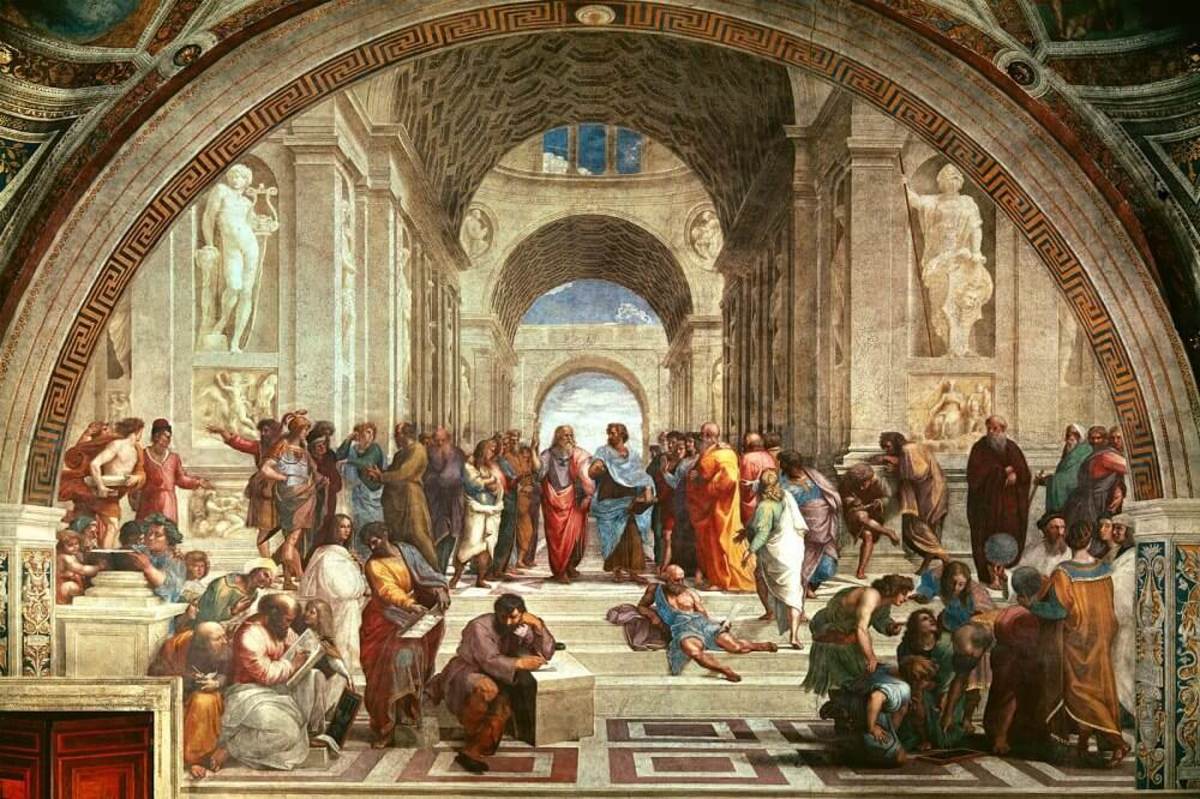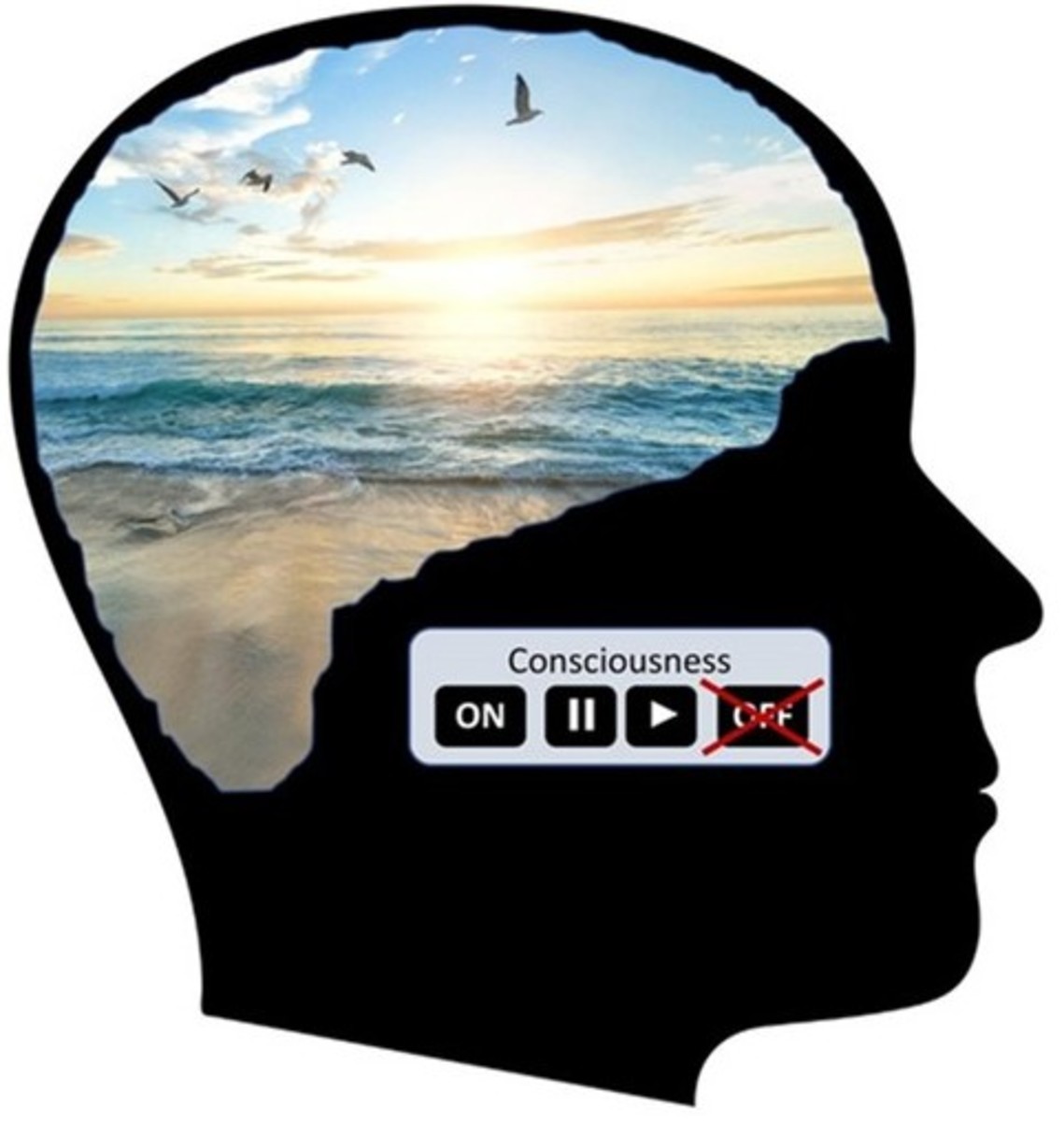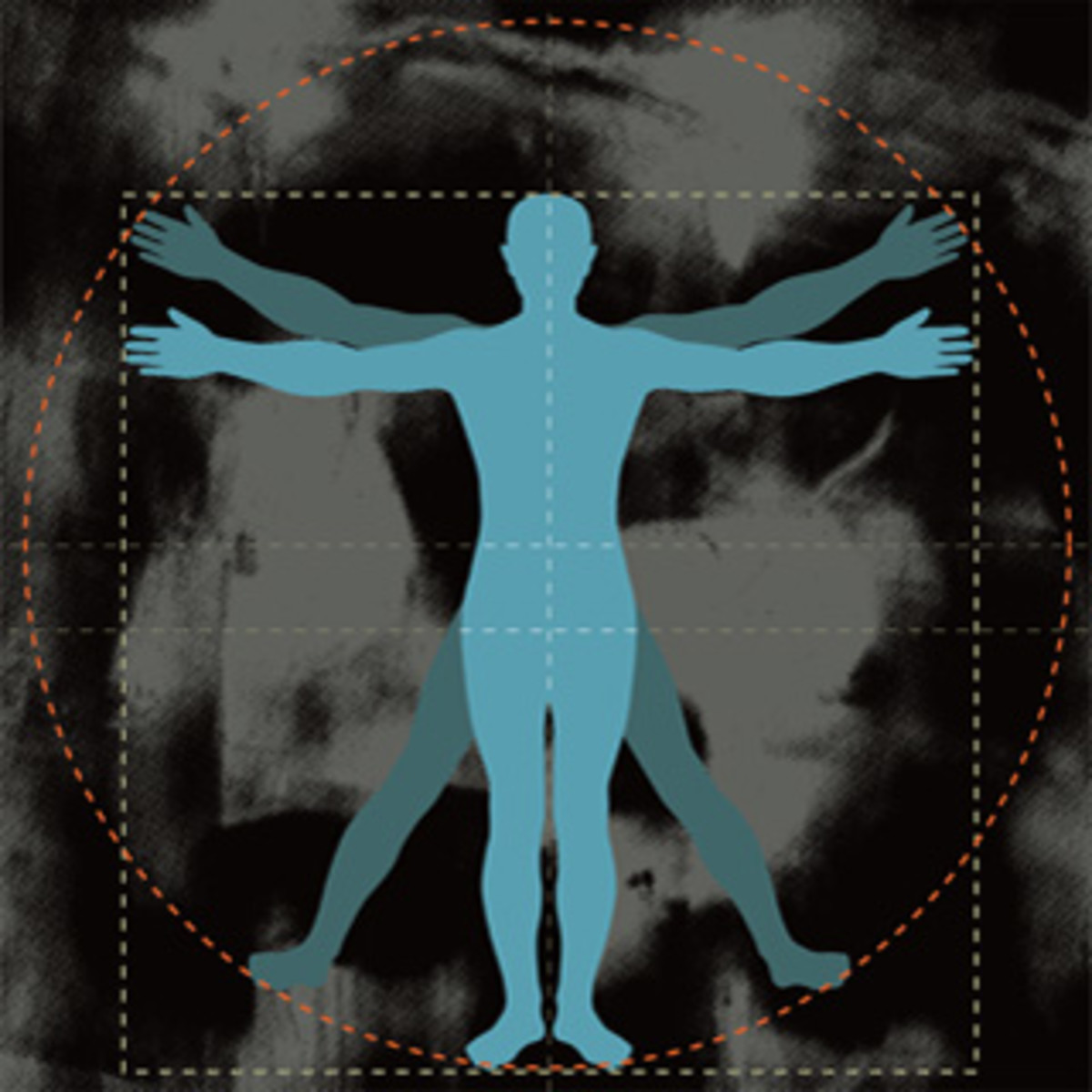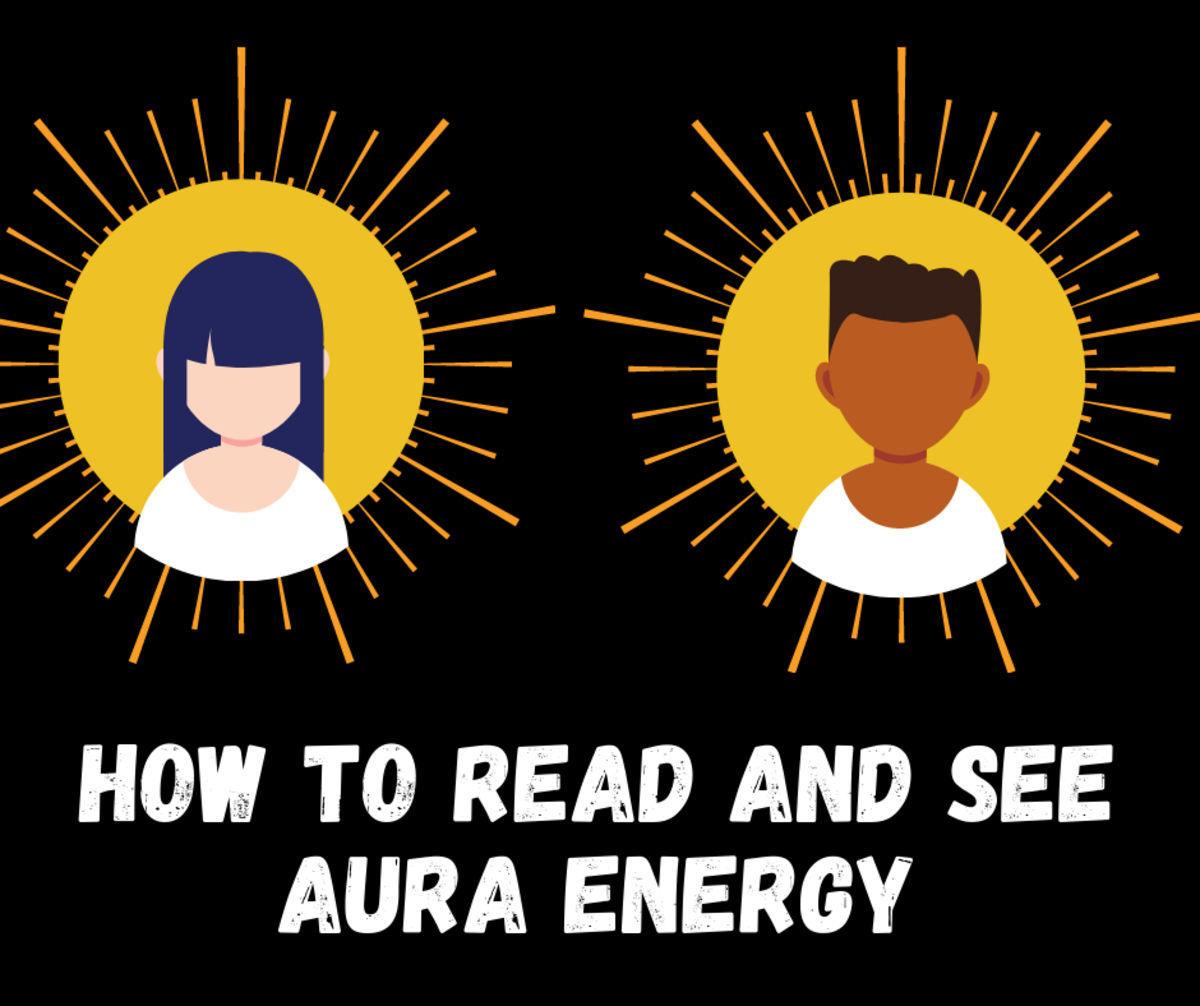Materialism, Dualism, and Consciousness
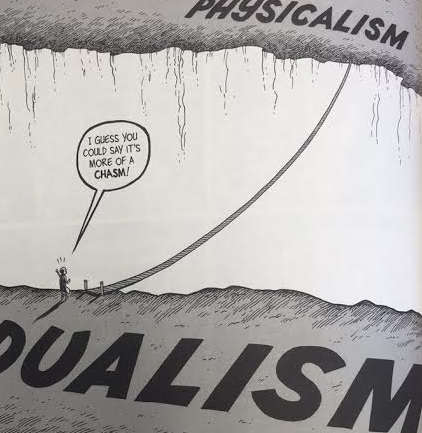
This article is inspired by and to an extent based on Chalmers’ lecture[1] with some technical detail omitted to make it more accessible.
Consciousness and its relation to the physical world, in particular the body hosting it, has worried Philosophers for over 2500 years. Conscious experience, especially that in dreams feels like it is something separate from the world. Physicalism, the position that everything, including consciousness, can be reduced to physics and Dualism, the position that mind and body are separate but interact both have problems and proponents of either position can produce arguments to refute the other. Here I look at arguments refuting Materialism and Dualism, without considering a particular variety of either.
It is nowadays rather easy to program a computer to be aware of its environment, for example printing or even saying I see a red circle when it is connected to a camera pointing to a red circle. It is not possible to tell whether the computer has, or even fellow humans have, the same experience we do when seeing a red circle. The same program may also allow the system to be aware of its internal environment, for example self testing but again this feels as if it is not the same as our internal thought processes
We can split consciousness into awareness and experience, experience being the possession of qualia which philosophers seem to treat as atoms of experience: seeing green, seeing a circle, feeling pain etc. These can be combined into molecules such as seeing a red circle. A quale is an element of experience that may require awareness though awareness does not require qualia. Thus consciousness is a compound of qualia and awareness and an entity may be aware of its external and internal environments.
One way to assign consciousness is to say that an entity is conscious if we can form some idea what it is like to be that entity. In practice such projections tend to suffer from anthropomorphism, though they may not be inaccurate: One can for example imagine what it might be like to be a conscious rock.
Physicalism, assumes everything is grounded in Physics, including consciousness. Dualism assumes consciousness is not grounded in physics and is in some sense outside physics. Neurologists tend to the belief that consciousness is an epiphenomenon arising from interactions between neurons, which can be called an emergentist/structuralist viewpoint. It is unclear how qualia can arise from such interactions, and equally unclear how consciousness can interact with unconscious matter.
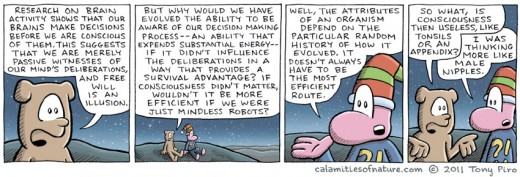
An Argument Against Materialism
Splitting consciousness into Awareness and Experience allows definition of phenomenal truths, which relate to experience, that is qualia and experience and non-phenomenal truths such as those expressed in the mathematical/physical description of the universe. This split can accommodate materialism and dualism.
The argument against materialism runs as follows, defining a Zombie as a physical duplicate of a person lacking only consciousness.
Consider the set of all non-phenomenal truths about a world ( for example ours) and take the conjunction (and) S of all these truths and let C be an arbitrary phenomenal truth such as “I am conscious” to which all can agree.
S & ~C is conceivable: A claim C is Conceivable if it is not a priori impossible but Zombies may be inconceivabl:
If S & ~C is conceivable it is metaphysically possible: A claim is metaphysically possible if there is a possible world in which it is true but conceivablilty may not entail possibility.
If S & ~C is conceivable and metaphysically possible then physicalism is false: .If there is a possible world like ours without consciousness then consciousness is an extra fundamental feature
Physicalism is false
It is logically conceivable that there is a possible world in which I am replaced by an unconscious automaton (a zombie) that behaves exactly like me, though I have every reason to doubt it is this one. Declaring that something is conceivable but not possible seems to me an extreme position falling foul of the paradox that something conceivable but impossible can be described and the description entails it is possible
The third step implies that there is a world in which Physicalism is false. Since I know myself to be conscious I can assert that Physicalism fails in this world.
Zombie Conceivability
The conceivability of Zombies is still an open question.
Marcus [2] suggests conceivability, is not the notion that something is possible but that conceivability is the possibility of imagining what it is like to to be some entity and that since zombies by definition lack qualia it is impossible to imagine what it is like to be a zombie but this definition of conceivability makes even rocks inconceivable. Chalmers notes that declaring zombies inconceivable requires a functionalist view of consciousness.
Marcus argues that Zombies are inconceivable by noting that it is impossible to imagine what it is like to be a zombie. One objection to Marcus' argument is that it also means that a rock is inconceivable since, if a rock is not conscious there is nothing it is like to be a rock. Against that imagine two possible worlds differing only in that rocks are conscious in one world and lack consciousness in the other. The argument against physicalism then stands. Another objection is to say that being able to conceive of an entity does not require being able to imagine what it is like to be that entity.
Chalmers has also argued [3], from a functional consciousness standpoint, the unlikelihood of Structural Zombies actually existing in this world.
An argument Against Dualism
Phenomenal properties are causally relevant to physical events: Intuitively true but intuition can be rejected.
Every caused physical event has a full causal explanation in terms of physics: An article of faith possibly undermined by quantum theory.
If every caused event has a full causal explanation in physical terms then every property caused by a physical event is grounded in physical properties:. This assumes phenomenal properties are caused events.
If phenomenal properties are grounded in physical properties then materialism is true.
Materialism is true
The first step is intuitively true: seeing a dropped hammer heading towards your foot causes the foot to move out of the way. Conversely having a spanner fall unobserved onto your foot causes you pain, definitely a phenomenal event. At the very least there seems to be a close relationship between the phenomenal and the physical. The second step seems reasonable but may be undermined by the (controversial) Conway-Kochen Free Will Theorem [7].
Dualism faces the problem of how mental events can cause physical events without themselves being grounded in physical events. The same problem arises for the hypothesis that the brain is merely a filter for a sea of universal experience outside the body [9] assuming experience is not grounded in Physics.
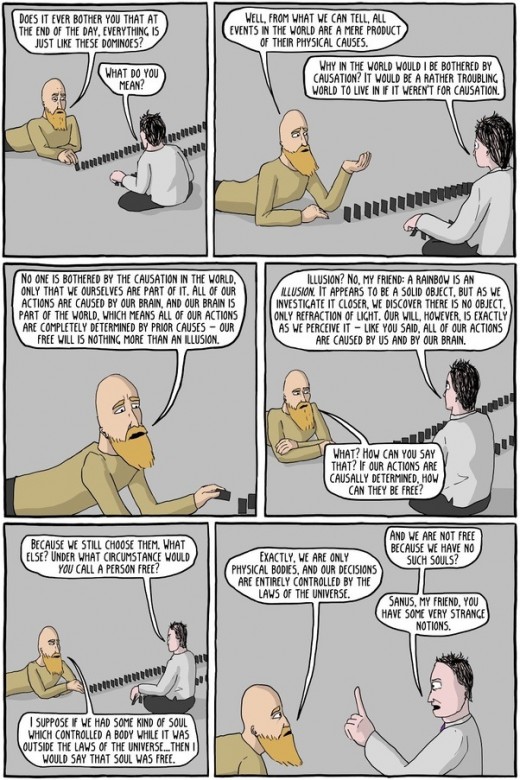
Materialism Versus Dualism
Materialism/physicalism requires physical truths to add up to truths about consciousness, possibly even that consciousness is a (remarkably stubborn) illusion. Any world in which materialism is true must include consciousness since otherwise a zombie world is conceivable. Materialism then faces the hard problem of consciousness, how can consciousness, that is qualia, arise from interactions between unconscious matter.
Dualism requires that a world that is physically like ours but in which consciousness does not exist is possible. It certainly seems conceivable that such a world can exist, but dualism then faces the causation problem: How can mental objects interact with and affect physical objects.
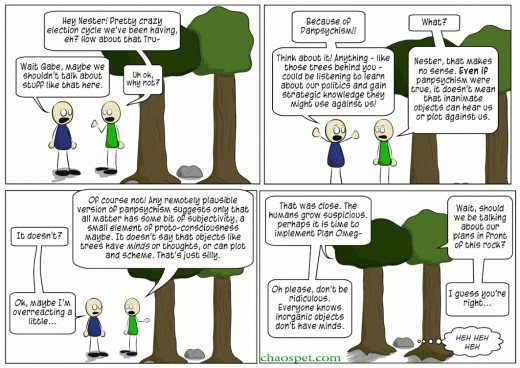
Panpsychism
Without compelling evidence for either Dualism or Physicalism there is a need for a position that is compatible with either. This means Panpsychism or emergentism [8] and I consider Panpsychism more attractive.
Panpsychism is the notion everything is conscious, for example the number 23, the City of London or Edinburgh Castle. It is possible to imagine oneself as each of these but this is purely a projection of human consciousness. Wittgenstein said that if a lion could speak, we could not understand him, which seems to mean that the lion’s experiences and world picture are so different they could not be expressed in a way we would understand. In practice there would be some qualia we share with them such as feeling hunger, feeling anger, experiencing pain which could be expressed in human language, something apparently possible for certain trained apes though there would almost certainly be some qualia that are hard if not impossible to translate.
The further we go from humans the fewer qualia we share. It is possible to imagine Edinburgh Castle having some qualia such as feeling heat or wind, harder for the City of London, which is not material and hard to define, and almost impossible for the number 23, a mathematical construct or relationship, even if we accept Tegmark’s Mathematical Universe Hypothesis.
Restricting ourselves to material entities this restricted panpsychism asserts that some fundamental physical entities like quarks or photons are conscious. This is panexperientialism and does not include and ability to think or reason. We cannot exclude the possobility a photon can think or reason but, apart possibly from Conway’s Free Will Theorems[7] there is no reason to believe they can think or reason.
Intuitively panpsychism is not inconsistent with Physicalism: even if everything is conscious consciousness may be grounded in the physical. It is also consistent with Dualism, but in either case there are potential problems with the interaction between consciousness and matter which will for reasons of space be explored in a future article.
Further Reading
- Panpsychism and Panprotopsychism: 2013 Amherst Lecture in Philosophy: Chalmers, David
- Marcus, Eric, WHY ZOMBIES ARE INCONCEIVABLE, Australasian Journal of Philosophy Vol. 82, No. 3, pp. 477±490; September 2004
- Chalmers, D: Absent Qualia, Fading Qualia, Dancing Qualia, in Conscious Experience, edited by Thomas Metzinger. Imprint Academic, 1995.
- Gödel, Escher Bach: Godel, Escher, Bach, D.R Hofstadter, Penguin Press
- Is Quantum Physics Behind Your Brain’s Ability to Think?
- Fisher. M Quantum cognition: The possibility processing with nuclear spins in the brain: Annals of Physics 362 (2015) 5
- The strong free will theorem John Conway and Simon Kochen, 2008
- Panpsychism: Stanford Encyclopedia of Philosophy
- The Mind-Body Problem: The Brain as filter for universal Mind

